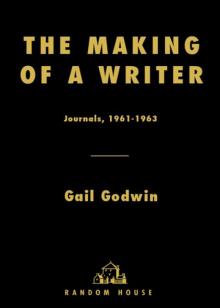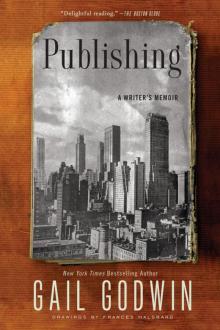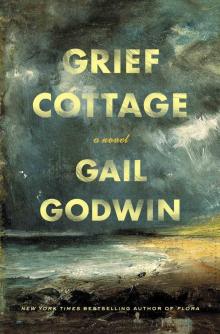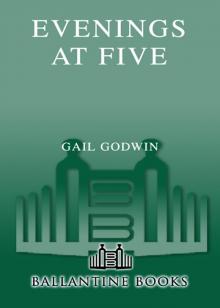- Home
- Gail Godwin
Unfinished Desires Page 6
Unfinished Desires Read online
Page 6
Four of the new day girls were graduates of St. Jerome’s, the parochial grammar school across the river. They would be bused the fifteen miles back and forth daily for the privilege of receiving a higher Catholic education. Even though one of them had a surname beginning with Y, Mother Ravenel had seen fit to bend the rule so they could arrive as a morning group, minus one mother, who worked as a court recorder. These girls and their mothers hung together, wary and faintly scornful of Mount St. Gabriel’s interview day with the parents. “Lora Jean could have come here just fine by herself, Mother Malloy. She’s the one who’s going to be at Mount St. Gabriel’s, not me.”
Lora Jean Cramer. Kay Lee Jones. Mikell Lunsford. Dot Yount. Tonight, before Compline, go through the roll and match images to names. Lora Jean, no-nonsense and stocky, a junior edition of her mother. Kay Lee, green-eyed and fey, with a strawberry-shaped birthmark on her neck—Mrs. Jones was the absent court stenographer. Mikell, tall, straw-haired, and tomboyish: must take after her father, since Mrs. Lunsford was dark, tiny, and demure. Dot, sneezing apologetically into a wet handkerchief, was allergic to goldenrod, Mrs. Yount explained. Also, as though ticking off her daughter’s further accomplishments, to eggs, tuna fish, nuts, and chalk dust.
Thus the four transfer girls from St. Jerome’s across the river. But try to fix them in your mind as individuals.
A last-minute cancellation: Lidia Caballos, from Venezuela, had eloped with her cousin. “Her father is taking steps to have it annulled,” Mother Ravenel told Mother Malloy. “He’s furious about the non-refundable boarder’s deposit. He didn’t see why, if the annulment goes through, Lidia can’t come to Mount St. Gabriel’s next semester. I told him I was very sorry, but it would be setting the wrong tone with the other girls.”
Mrs. Frew had driven all the way from Knoxville to enter her stately daughter, Elaine, as a boarder in the academy as Mrs. Frew herself, the former Francine Barfoot, had entered as a freshman boarder in the fall of 1930. “I was in Mother Ravenel’s class, back when she was our talented Suzanne and our class president. She chose me to compose and play the flute music for our freshman play, The Red Nun, which she wrote herself. My time at Mount St. Gabriel’s was so happy, Mother Malloy. Unfortunately, Daddy passed away and I had to drop out my junior year. It broke my heart. But here is my Elaine, to finish what I started.”
Elaine Frew, an advanced musician, was to have piano lessons twice a week from a retired concert artist in town who handpicked his few students and charged a fortune.
“Except for her flute, Francine Barfoot was rather undistinguished, but she tried hard at whatever she did and you could trust her to be loyal. Not enough is said about those girls who are content to lend bulk to the class pudding rather than always having to be the cherry on top”: that was Mother Ravenel’s thumbnail sketch of “the third mother” in the class of ‘34.
Noon—the hour of Sext—the Angelus
Five minutes before noon, Mother Finney turned off the gas oven, leaving the trays of macaroni and cheese inside to keep warm. She washed her hands under the tap, dried them on a fresh towel with the priestly care that precedes sacred duties, and set off, with her slight limp from a girlhood horse fall, down the trophy-lined hall to ring the Angelus.
The knotted end of the thick bell rope ended in a stairwell and was cordoned off by a circular wrought-iron gate, which Mother Finney now unlocked with a key from her deep pocket. The temptation of an accessible rope connected to the thundering peal of a bell that could be heard for miles around had proved too much for several generations of little girls—and even some older ones. In 1939 a senior had announced her engagement via the bell and narrowly escaped being expelled. The last unauthorized bell ringer, before the gate went up in 1944, was a fifth-grade boarder, overexcited by the Friday night movie, Arsenic and Old Lace. She had yanked and swung on the forbidden rope to the horror and delight of her fellow boarders and, while its wild peals were still echoing from the tower, had raced up the stairs screeching Cary Grant’s infamous lines: “Insanity runs in my family. It practically gallops!”
Mother Finney often thought of that little girl when ringing the Angelus bell. The child hadn’t stayed at Mount St. Gabriel’s for long, though she hadn’t been expelled. There were always those comers and goers, the ones dropped off by out-of-town parents, then just as suddenly whisked away. Mother Finney kept a special place in her heart for the bolder, high-spirited girls. She hoped God would grant that little bell ringer enough suitable outlets for her energies and would help her to distinguish between exuberant mischief and what Mother Wallingford, who had supremely embodied it, had called “holy daring.”
Three rings and a pause; three rings and a pause; three rings and a pause. Hark, drop your tools, and remember you are inside the Eternal Presence. Followed by the nine consecutive peals heralding the hour of no shadows, the end of morning’s work: resonating through the building and billowing out into the valley below. If the wind was blowing the right way, jail prisoners on the tenth floor of the downtown courthouse could count the rings of the Mount St. Gabriel’s bell.
Mother Finney’s frail, curved body belied her still powerful arms. She rang the bell cleanly, with no irresolute half measures. As a young woman she had broken recalcitrant yearlings on her family’s horse farm in Galway. Now she was in her eighty-ninth year, having outlived Elizabeth Wallingford, her fellow adventurer and beloved foundress, by two long decades.
The afternoon interviews
Eight girls, from one-thirty to five, M through Y, followed by Vespers and dinner.
Mrs. Saul Meyer, a stylish woman with a piquant mix of guttural German and Carolina drawl, introduced herself as “Judy Meyer.” “Rebecca has been at Mount St. Gabriel’s since first grade, Mother Malloy. We emigrated here in forty-one. She loves this school, and so do we. Her father and I are observant Jews, and we’re raising Becky in our traditions. But, you know, in Vienna, both Saul and I attended Catholic gymnasia. The nun who taught me penmanship had us copy out the catechism, so I know it almost as well as I do the Torah!”
Rebecca Meyer: small for her age, with poised, old-world child’s manners. A thick flame-red braid descending to her waist. Spoke with a Carolina drawl, but said very little.
Ashley Nettle, new day girl, and her mother, Virginia Nettle, who spoke in haughty, theatrical phrases. Jumpy, nervous Ashley, flyaway hair the color of tinsel, swallowed her words; she jiggled her legs under the table and her eyes darted about the parlor, as though looking for a way out. “Ashley’s father is the new assistant headmaster at Pisgah Prep—the private school for boys. Ashley will be riding in with the Dutch contingent from Enka Village. It’s so convenient, as we’re right on their route.”
Later, Mother Malloy asked Mother Ravenel if Mrs. Nettle was British. “No, she just gives herself airs,” replied the headmistress. “That Ashley will certainly need some work. I wish she were boarding with us, but at least she’ll be riding with the Dutch girls from the Enka rayon plant. They’ll be a good influence. They’re relaxed and friendly and speak better English than she does.”
Maud Norton, a tall, handsome, physically developed girl, and her mother, Lily Norton. “We’re old-timers in Mountain City, Mother. My mother was a Sluder, one of the pioneer families here. Mother and I run the Pine Cone Lodge. What is your accent? Boston! I thought so! I worked for a while up in Cape May, New Jersey, that’s where I met my husband, Mr. Norton. When I came back to Mountain City, everyone swore I had a ‘northern’ accent, but I don’t think so, do you? Mr. Norton and I are no longer married, but it was a very amicable parting. Maud spent this summer in Palm Beach with her father and his present wife. They both fell head over heels in love with her.”
Maud, who had been staring almost rudely at her new teacher, blushed from the neck up and rolled her eyes.
“Was it a good summer for you in Florida, Maud?” the nun asked.
“Everything was wonderful, Mother, but I’m glad to be back in school.”
/>
“Maud loves her schoolwork,” Lily Norton chimed in, “and of course she missed her best friend, Tildy Stratton, didn’t you, hon? Those two have been hand in glove since third grade. They—”
“Tildy and I corresponded regularly,” said Maud coolly, cutting her mother off.
Mother Malloy had not realized how depleting the long day of continuous interviews had been until she looked up and saw Henry Vick escorting a slight girl with a pronounced chin and a dark fringe of bangs. Their entrance made the parlor, which had grown smaller and more oppressive in the afternoon heat, suddenly feel airier. Mother Malloy felt lighter of spirit and surer of her ground. Here was the kind man she had first encountered smoking his pipe on the marble ledge of the unfinished sculpture of the Red Nun. On whose cool ledge she had rested after her breathlessness, or whatever it was, while he stood close by and conversed with her in his easy way, saying much without seeming to. And this would be Chloe, another orphan like herself. Though Chloe had known her parents. And Kate Malloy had not been blessed with an uncle like Mr. Vick.
“It’s good to see you again, Mother Malloy. This is my niece, Chloe Starnes.”
“How do you do, Chloe. I hope you’ll soon feel at home with us at Mount St. Gabriel’s.”
“I expect I will, Mother. My mother, Agnes Vick, went here from first grade through high school. She told me all about how things are at Mount St. Gabriel’s.”
“In that case, you can be a great help to me.” Mother Malloy felt herself smiling without trying to. “I’ve been here less than a week and have almost everything to learn about how things are.”
It was rare for someone Chloe’s age to look you in the eye without defenses and let herself be looked back at. Perhaps you had to have suffered a great loss first.
Mary Tilden (“Tildy”) Stratton was accompanied by her older sister, Madeline, a beauty with the gift of gab. “Our mama sends her apologies, Mother Malloy, but she’s backed up on her darkroom work down at the studio—she had a bunch of weddings in August. So I’m being mother to Tildy today. I’m an old Mount St. Gabriel’s girl myself, until I got uninvited back at the end of my freshman year. Though things have turned out well enough for me at Mountain City High.”
“Do you go by your full name, Mary Tilden, or do you prefer Tildy?” Mother Malloy asked the younger girl. She was not a beauty like her sister, though appealing in a sweet, stalwart way. Her face was so sunburned you had to look closely for the expressions. But they were there.
“I almost think—” the girl began haughtily. Then she seemed about to cry, but switched to anger. “I might change my name to—”
“Don’t make any sudden decisions,” her sister advised. To Mother Malloy, she said, “She’s just had the strangest little contretemps in the drive way with her best friend, Maud—”
“You shut up!”
“Sorry, little one. I’m always overstepping, aren’t I? I guess I’m not used to being motherly. I was once in ninth grade myself, Mother Malloy, and interview day at Mount St. Gabriel’s makes everyone cross. Listen, Tildy, run ahead and stop Henry Vick before he drives away with Chloe and ask if they’d like to come by our house for cocktails or tea or anything at all.”
Thus Tildy’s dignity was salvaged before any tears fell, and Madeline stayed behind for a word with Mother Malloy. “I guess you don’t think much of me, Mother, but I love my baby sister, and, oh, this place is such a hotbed of bitchery. Generations of bitchery and intrigue! I can say it now, I can say anything I want. I can even say you are beautiful and I hope you enjoy being a nun. I had a beautiful aunt, my mother’s twin sister, who also had a vocation, but something went wrong and then later she married Henry Vick and was killed on their honeymoon. They were in Rome and she was knocked down by a van. I want Tildy to keep her intrepid little soul—I have half a mind to coach her in how to get expelled so I can keep better watch over her over at Mountain City High, only you can’t go there till tenth grade.”
“On the contrary, Madeline, I think I like you very much,” said Mother Malloy. “I hope you’ll come and see me again. In the meantime, I promise to do my best to watch over your sister’s intrepid soul.”
The last were the two Dutch girls: Hansje Van Kleek and Beatrix Wynkoop, from Enka Village, the rayon plant. The largest in the world, Mother Ravenel had informed her. (“When the Dutch set out to do something, they do it right.”) The mothers of the two girls, looking hardly older than their offspring, paid their cheerful respects to the new teacher and then went off to visit Mother Finney. “We could smell her oatmeal cookies all the way from the parking lot!”
Both Hansje and Beatrix spoke excellent, unaccented English, from which word-swallowing Ashley Nettle would surely profit as they rode to and from the school together. Mother Malloy made every effort to distinguish Hansje from Beatrix, both tall blond girls with perfect manners, both returning for their third year at Mount St. Gabriel’s. She noted, like a possibly significant punctuation mark, the down-turned left corner of Hansje’s mouth, as though she had a reservation about life even as she smiled, and Beatrix’s seemingly unconscious gesture of twirling a lock of hair around her finger as she attended to you expectantly, as if you were on the verge of saying something wonderful.
Before Compline tonight, I will sit at the little desk in my room, open my roll book, and go down this list of girls. And I will say each name aloud, followed by a short prayer: “Help me to see what I need to see about this young human soul.”
Mother Malloy’s Ninth Grade, 1951
Marta Andreu
Lidia Caballos (last-minute cancellation)
Lora Jean Cramer
Elaine Barfoot Frew (mother, Francine Barfoot, ‘34)
Josephine (Josie) Teresa Galvin
Gilda Gomez
Kay Lee Jones
Mikell Maria Lunsford
Rebecca Meyer
Ashley Nettle
Maud Norton
Chloe Vick Starnes (mother, Agnes Vick, ‘34; aunt by marriage, Antonia Tilden, ‘34)
Mary Tilden (Tildy) Stratton (mother, Cornelia Tilden, ‘34; aunt, Antonia Tilden, ‘34)
Hansje Van Kleek
Beatrix Wynkoop
Dorothy Yount
CHAPTER 6
The Afterrunner
Sunday, June 24, 2001
Feast of St. John the Baptist
House of Olivia and Gudge Beeler
Mountain City, North Carolina
THIS IS HER last night in what Olivia Stewart Beeler, class of 1974, refers to as “your very own VIP guest suite, Mother Ravenel.”
Tomorrow morning Gudge and Olivia will drive her to the airport to check her luggage—Olivia has lent her a second suitcase to carry the tape recorder plus other gifts from the girls—and impress on airline personnel that this legally blind old lady must be conveyed like a precious heirloom to her destination. Unfortunately, there are no direct flights to Boston, so a wheelchair will be waiting at her gate at Dulles to speed her to her connection. It has all been arranged and she is grateful.
At Logan Airport in Boston, she will be met by Sister Bridget, who will promptly disabuse her of any notions of heirloom status picked up in Mountain City. Sister Bridget, sixty-five, is the “young” superior of all that is left of the Order of St. Scholastica, though there’s not much left for her to be superior to. She is the only one in the house who still has a driver’s license, and will make sure to squeeze in as many errands as possible between the baggage carousel at Logan (“Two suitcases, Sister Suzanne? How can that be when you left with only one?”) and the Order’s retirement house in Milton. Sister Bridget calls all the nuns “Sister,” followed by their given name, even though the old ones have been accustomed to “Mother,” followed by their surname, for most of their professed lives.
Fortunately, all the young in power are not as mirthless and bullying as Sister Bridget. At Mass at the basilica this morning, Father Thad, the new monsignor, had preached a lively sermon on John the Baptist
.
“It’s not easy to be a forerunner,” Father Thad had said. “But when something larger than life is about to appear in our midst, someone has to go first … you know, like those cars with flashing headlights that precede a truck bearing an oversize load. People have to be prepared. The forerunner has to announce—has, even, to forewarn: ‘Pay attention! Something larger than you’re used to is riding into town.’”
After Mass, Father Thad, a towering blur clothed in red vestments for the martyr’s feast, greeted his congregation as they filed out through the narthex. When her turn came, he swooped down and gathered her in his arms. His garments smelled of incense; his warm neck exuded a spicy aftershave.
“Ah, Mother Ravenel, I don’t like this at all! In a month’s Sundays I’ve gone and lost my heart to you, and now you’re leaving us tomorrow. What do you expect me to do?”
“I expect you to be right here when I come back next year,” she volleyed back in her headmistress tone. “And, Father, your sermon has helped me to see what I may be, in a larger sense. I am just the opposite of a forerunner. I am what comes afterward—an ‘afterrunner,’ if there is such a word.”
“Well,” he replied, delighted, “there is now.”
“Yes, Father, you’ve helped me to see that I am to be an afterrunner. My old girls have talked me into writing a history of Mount St. Gabriel’s. I’ve been speaking it into the tape recorder, which I’ll be taking back to Boston with me tomorrow. Please pray that I live to complete my assignment to the glory of God and that I do justice to my material.”

 The Making of a Writer
The Making of a Writer The Making of a Writer, Volume 2
The Making of a Writer, Volume 2 Old Lovegood Girls
Old Lovegood Girls Flora
Flora Publishing
Publishing The Finishing School
The Finishing School Grief Cottage
Grief Cottage Evenings at Five
Evenings at Five Unfinished Desires
Unfinished Desires